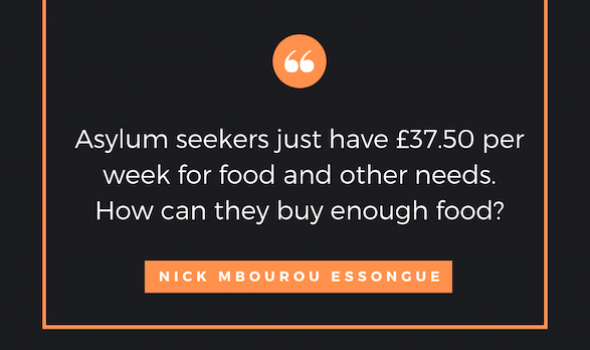Being an asylum seeker during Covid
Being an asylum seeker during Covid

If Covid-19 has an impact on UK citizens, it also and particularly has an impact on asylum seekers and those who are homeless. Even if the government has taken measures to help some of them, their lives during this period are very different, with support from charities much less available and a real discrepancy between the money received and actual needs.
Because of the Covid-19 pandemic, British people are advised to stay home to protect the NHS and save lives. This lockdown has been implemented progressively across different sectors, with announcements made by the Prime Minister and senior politicians. Like everyone else, asylum seekers and those who are homeless are being asked to stay home during this critical time. But these are people who before often spent time in different charities, which provided food, advice, psychological help, and WiFi, and who are also now asked to respect the lockdown.
For many UK citizens, appropriate measures have been taken, such as financial support for businesses and workers. Nick Mbourou Essongue, an asylum seeker who arrived from Gabon in 2017, describes this as a “discriminatory environment”.
“Do you think this is condemnation for the whole population of asylum seekers and refugees alike, regardless that they ran away from a very hostile environment, for not being a citizen of the country?” he asks.
One solution would be for the Government to have more consideration for asylum seekers and people who are homeless – for example, such as creating a crisis fund that could help them respect the ‘stay home’ command, one of the most important parts of the lockdown.
Staying at home, living in safety: meaningful concepts but difficult to execute
It's clear that when the UK Government declared a lockdown, the main purpose was to stop the spread of Covid-19. Nobody should have to pass away because of the Covid-19 pandemic. Nobody should need to have another person die because of him. That is why people stay at home. However, some asylum seekers who have been asked about this situation have said they are worried about it. Some of them say they have to stay home without the internet, radio or television. This is a very difficult situation when they don’t know when the end of the lockdown will come and that maybe it will be renewed.
Their financial situation is also very difficult.
"Asylum seekers just have £37.50 per week for food and other needs. How they can buy enough food? How they can avoid being outside if they have to go to the cash point every Monday?" said Nick Mbourou Essongue.
The unconditional support of charities put in trouble during this period
With the number of cases increasing every day, the doors of charities are not likely to be opening soon. Sam of C4WS Homeless Project considers this as "a time of challenges and uncertainty". Even in this situation, his organisation is continuously in touch with some of the most vulnerable people.
“We are providing continuous remote support,” he said. “This takes the form of regular phone calls, messages, WhatsApp and FaceTiming, as well as arranging for care packages to be delivered to them. Our Mentoring and Befriending Programme has also moved to online platforms so that people can still receive this support.”
This approach clearly includes providing data or mobile top-ups for phone calls. The organisation is also looking to explore moving their Jobs Club and English Classes online so as to support those who need these.
The mental health of the people he supports is a big concern for Sam: "There is a lot of anxiety about what is going on," he said. This concern partly explains the efforts that his organization continues to make, despite some changes, in particular the plans for housing and employment that they had set up and that have now been radically altered. But the uncertainty of what will happen next is the biggest problem. There are many things that need to be reviewed and adapted to current circumstances.
Speaking about the charity’s beneficiaries, he said: "As a project, we are also working with people who were in the shelter and who are now being relocated. The loss of jobs, the worries about how to pay their rent, concerns about the lack of networks and the management of self-isolation and the impact on wellbeing are all issues we need to explore with them.” But there are some significant obstacles to continuing their support for those in need.
As the world heads towards the peak of the Covid-19 pandemic, we can say according to the number of deaths that the impact on humanity is quite significant. For some, the damage is irreparable. That includes many asylum seekers and people who are homeless, being stuck between the Government’s official guidance and the support they receive. The habit of living in community with charities during this period is almost impossible - even if some are trying to maintain their services through multifaceted support at a distance.
A solution must be found for the eradication of Covid-19. In the meantime, asylum seekers and those who are homeless must be treated with more consideration and support giving to charities to help them continue their work.


